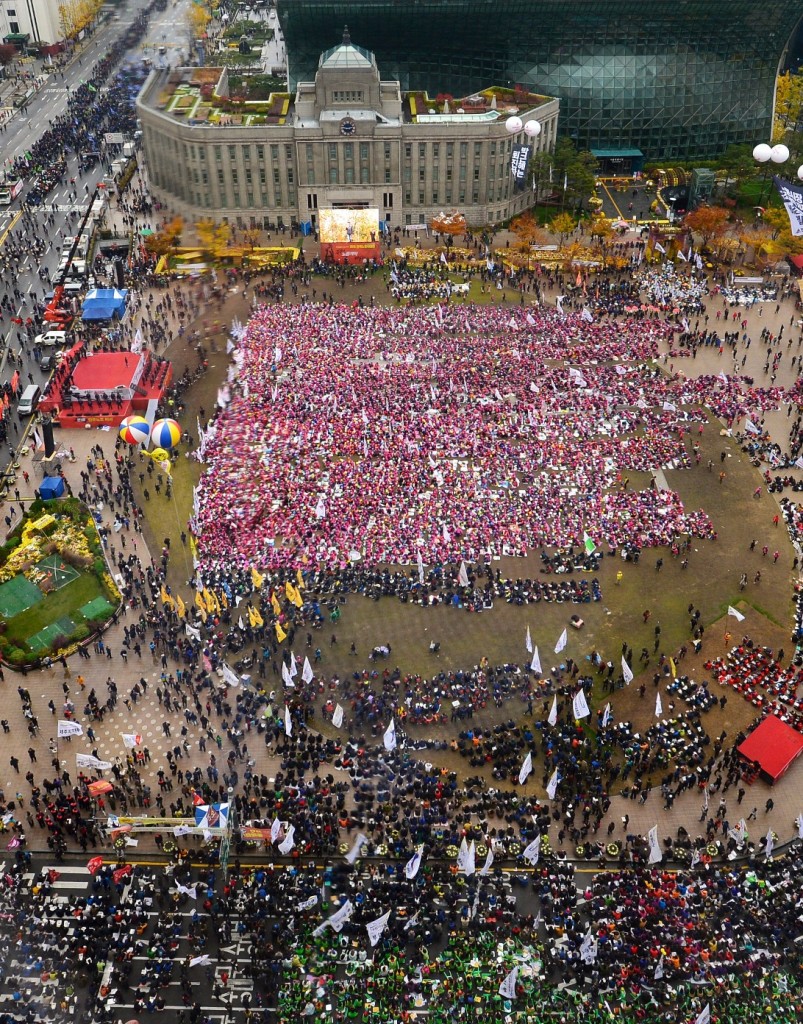- California Assembly OKs highest minimum wage in nation
- S. Korea unveils first graphic cigarette warnings
- US joins with South Korea, Japan in bid to deter North Korea
- LPGA golfer Chun In-gee finally back in action
- S. Korea won’t be top seed in final World Cup qualification round
- US men’s soccer misses 2nd straight Olympics
- US back on track in qualifying with 4-0 win over Guatemala
- High-intensity workout injuries spawn cottage industry
- CDC expands range of Zika mosquitoes into parts of Northeast
- Who knew? ‘The Walking Dead’ is helping families connect
Thousands march in South Korean anti-government protest
SEOUL, South Korea (AP) — Tens of thousands of anti-government demonstrators marched in Seoul on Saturday in what police believed was the largest protest in the South Korean capital in nearly a decade.
About 80,000 people were expected to turn up for the downtown rallies that were to stretch into the evening, according to an official at the Seoul Metropolitan Police Agency, who didn’t want to be named, citing office rules.
The marches, organized by an umbrella labor union and civic groups, brought together protesters with a diverse set of grievances against the government of conservative President Park Geun-hye, including her business-friendly labor policies and a decision to require middle and high schools to use only state-issued history textbooks in classes from 2017.
Members of the Korean Confederation of Trade Unions briefly clashed with police who unsuccessfully tried to detain KCTU President Han Sang-goon during a news conference, but there were no immediate reports of injuries. A Seoul court had issued an arrest warrant for Han over a failed court appearance, after he was indicted for his involvement in organizing a May protest that turned violent.
Demonstrators, many of them wearing masks and carrying banners, occupied a major downtown street and began marching between tight perimeters created by police buses, intended to block them from entering large roads leading to the presidential Blue House. A large number of police, many wearing helmets and body armor, move swiftly to flank the demonstrators.
This was probably the largest crowd seen in a demonstration in Seoul since 2008, when people poured onto the streets to protest the government’s decision to resume U.S. beef imports amid lingering mad cow fears, said the Seoul police official.
Labor groups have been denouncing government attempts to change labor laws to allow larger freedom for companies in laying off workers, which policymakers say would be critical in improving a bleak job market for young people.
Critics say that the state-issued history textbooks, which haven’t been written yet, would be politically-driven and might attempt to whitewash the brutal dictatorships that preceded South Korea’s bloody transition toward democracy in the 1980s.
Park is the daughter of slain military dictator Park Chung-hee, who ruled the country in the 1960s and ’70s, and whose legacy as a successful economic strategist is marred by records of severe oppression.
South Korean police in May detained over 40 people when protests over the government’s labor polies and the handling of a year-old ferry disaster spiraled into violence, leaving several demonstrators and police injured and many police buses damaged.













![일본 사도광산 [서경덕 교수 제공. 재판매 및 DB 금지]](http://www.koreatimesus.com/wp-content/uploads/2024/07/PYH2024072610800050400_P4-copy-120x134.jpg)



Pingback: KCTU Leads Largest Protest Since 2008 Anti-US Beef Crisis | ROK Drop